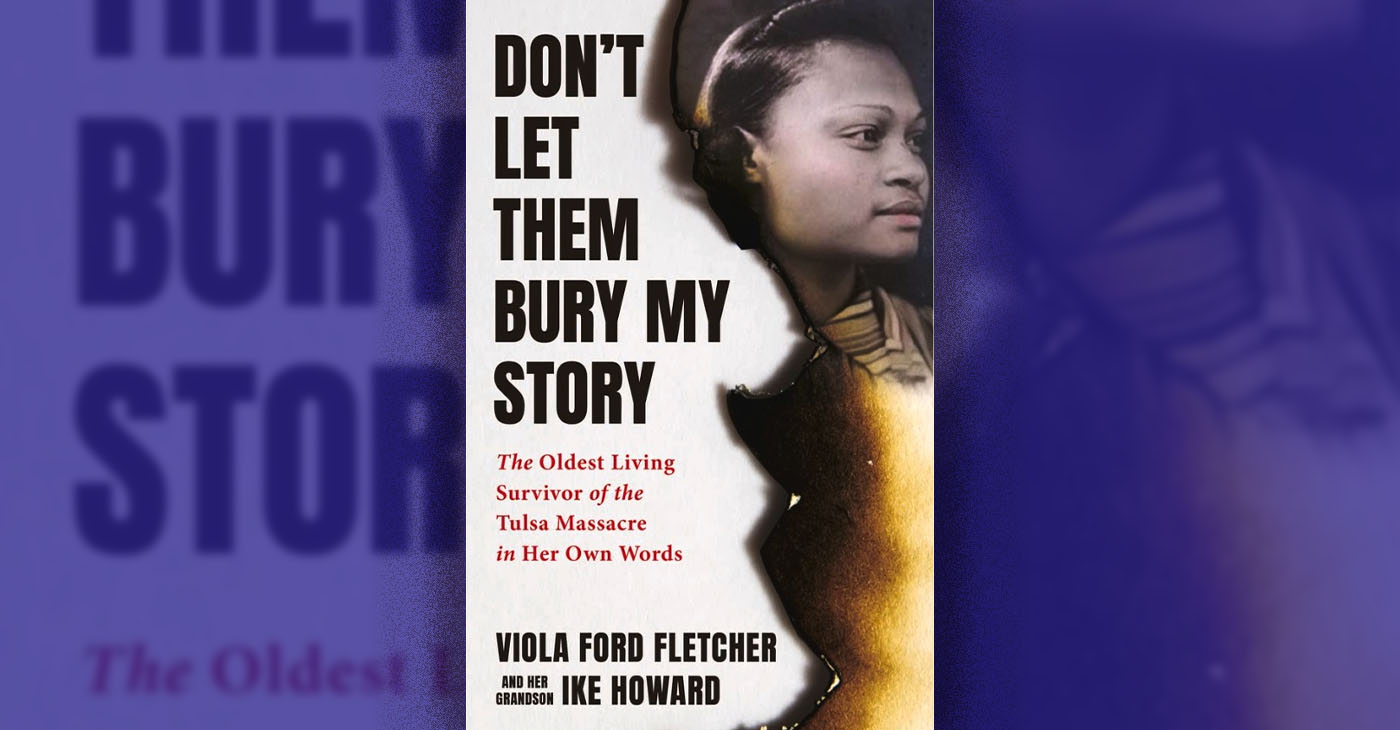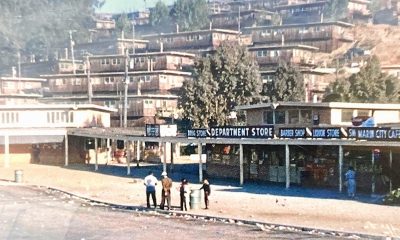Activism
Living to Tell the Tale: 109-Year-Old Tulsa Race Massacre Survivor Releases Memoir
A memoir written by the oldest survivor of the Tulsa Race Massacre has assured that her testimony before the U.S. Congress two years ago won’t be the last we hear of Viola Ford Fletcher. In March, two months before the 102nd anniversary of an armed white mob’s destruction of Greenwood, a thriving Black community of Tulsa, Okla., Mocha Media Inc. proudly announced the release of Fletcher’s book, “Don’t Let Them Bury My Story: The Oldest Living Survivor of the Tulsa Race Massacre in Her Own Words.”

By Tamara Shiloh
A memoir written by the oldest survivor of the Tulsa Race Massacre has assured that her testimony before the U.S. Congress two years ago won’t be the last we hear of Viola Ford Fletcher.
In March, two months before the 102nd anniversary of an armed white mob’s destruction of Greenwood, a thriving Black community of Tulsa, Okla., Mocha Media Inc. proudly announced the release of Fletcher’s book, “Don’t Let Them Bury My Story: The Oldest Living Survivor of the Tulsa Race Massacre in Her Own Words.”
This groundbreaking memoir marks the 102nd anniversary of the tragic event on May 30, 1921, that remains the worst incident of racial violence in U.S. history.
Co-authored by her grandson, Ike Turner, Mother Fletcher, as she is affectionately known, takes readers on a poignant and harrowing journey through her experiences as the oldest survivor and last living witness of the Tulsa Massacre of 1921.
From being a terrified 7-year-old awakened in the middle of the night to flee her burning Greenwood neighborhood, to her role as a 107-year-old matriarch testifying before Congress, Fletcher seeks justice for the families affected by this immense tragedy.
Fletcher’s vivid prose recounts the violence she witnessed and experienced during the massacre. Memories of the white mob, shootings of Black men, bodies in the streets, burning buildings, and the sound of airplanes overhead haunt her to this day. While the nation may have forgotten this history, Fletcher carries its weight, determined to ensure it is never buried or erased.
Tulsa in 1921 was deeply segregated but Greenwood’s ‘Black Wall Street’ thrived as a prosperous business district, home to 10,000 Black residents. However, dreams of generational wealth were shattered when racial violence claimed hundreds of Black lives. Survivors, who lost loved ones and millions of dollars in property, were forcibly interned in camps without accountability for the atrocities committed against them.
These traumatized citizens faced a hostile country that used military force against them and threatened their lives if they shared their stories. For 102 years, survivors patiently awaited acknowledgment, a voice, and restoration.
Fletcher lived in fear and silence until her grandson, Ike Howard, a retired military veteran, encouraged her to conquer her fears and share her truth. Recognizing the significance of her experiences, he believed her longevity was a blessing, enabling her to reveal the truth about Tulsa.
Published by Mocha Media Inc., a Black-woman-owned company committed to diverse content, “DON’T LET THEM BURY MY STORY” will be released on July 4, 2023, Fletcher’s 109th birthday.
Mocha Media Inc., CEO Margo Ochoa admires Mother Fletcher’s contribution to keeping the Tulsa Race Massacre’s survival story alive. The publishing model not only provides a platform for marginalized writers but also offers immediate royalties, contributing to Fletcher’s and her family’s economic restoration.
To celebrate the memoir’s release, Fletcher, Howard, and Van Ellis, Fletcher’s “baby brother” who wrote the foreword, embarked on a nationwide tour during spring and summer 2023. The tour allows audiences to engage with these survivors, hear their stories firsthand, and honor the resilience of those affected by the Tulsa Race Massac
“Don’t Let Them Bury My Story” is not just a memoir; it’s a testament to the power of storytelling and the preservation of history. Fletcher’s courage and determination inspire future generations, emphasizing our collective responsibility to confront past injustices and strive for a more equitable future.
Pre-order your copy now at www.multiculturalbookstore.com.
Activism
Oakland Post: Week of April 24 – 30, 2024
The printed Weekly Edition of the Oakland Post: Week of April 24 – 30, 2024

To enlarge your view of this issue, use the slider, magnifying glass icon or full page icon in the lower right corner of the browser window. ![]()
Activism
Oakland Post: Week of April 17 – 23, 2024
The printed Weekly Edition of the Oakland Post: Week of April 17 – 23, 2024

To enlarge your view of this issue, use the slider, magnifying glass icon or full page icon in the lower right corner of the browser window. ![]()
Activism
Oakland Schools Honor Fred Korematsu Day of Civil Liberties
Every Jan. 30, OUSD commemorates the legacy of Fred Korematsu, an Oakland native, a Castlemont High School graduate, and a national symbol of resistance, resilience, and justice. His defiant stand against racial injustice and his unwavering commitment to civil rights continue to inspire the local community and the nation. Tuesday was “Fred Korematsu Day of Civil Liberties and the Constitution” in the state of California and a growing number of states across the country.

By Post Staff
Every Jan. 30, OUSD commemorates the legacy of Fred Korematsu, an Oakland native, a Castlemont High School graduate, and a national symbol of resistance, resilience, and justice.
His defiant stand against racial injustice and his unwavering commitment to civil rights continue to inspire the local community and the nation. Tuesday was “Fred Korematsu Day of Civil Liberties and the Constitution” in the state of California and a growing number of states across the country.
One OUSD school is named in his honor: Fred T. Korematsu Discovery Academy (KDA) elementary in East Oakland.
Several years ago, founding KDA Principal Charles Wilson, in a video interview with anti-hate organization “Not In Our Town,” said, “We chose the name Fred Korematsu because we really felt like the attributes that he showed in his work are things that the children need to learn … that common people can stand up and make differences in a large number of people’s lives.”
Fred Korematsu was born in Oakland on Jan. 30, 1919. His parents ran a floral nursery business, and his upbringing in Oakland shaped his worldview. His belief in the importance of standing up for your rights and the rights of others, regardless of race or background, was the foundation for his activism against racial prejudice and for the rights of Japanese Americans during World War II.
At the start of the war, Korematsu was turned away from enlisting in the National Guard and the Coast Guard because of his race. He trained as a welder, working at the docks in Oakland, but was fired after the bombing of Pearl Harbor in 1941. Fear and prejudice led to federal Executive Order 9066, which forced more than 120,000 Japanese Americans out of their homes and neighborhoods and into remote internment camps.
The 23-year-old Korematsu resisted the order. He underwent cosmetic surgery and assumed a false identity, choosing freedom over unjust imprisonment. His later arrest and conviction sparked a legal battle that would challenge the foundation of civil liberties in America.
Korematsu’s fight culminated in the Supreme Court’s initial ruling against him in 1944. He spent years in a Utah internment camp with his family, followed by time living in Salt Lake City where he was dogged by racism.
In 1976, President Gerald Ford overturned Executive Order 9066. Seven years later, the 9th Circuit Court of Appeals in San Francisco vacated Korematsu’s conviction. He said in court, “I would like to see the government admit that they were wrong and do something about it so this will never happen again to any American citizen of any race, creed, or color.”
Korematsu’s dedication and determination established him as a national icon of civil rights and social justice. He advocated for justice with Rosa Parks. In 1998, President Bill Clinton gave him the Presidential Medal of Freedom saying, “In the long history of our country’s constant search for justice, some names of ordinary citizens stand for millions of souls … To that distinguished list, today we add the name of Fred Korematsu.”
After Sept. 11, 2001, Korematsu spoke out against hatred and discrimination, saying what happened to Japanese Americans should not happen to people of Middle Eastern descent.
Korematsu’s roots in Oakland and his education in OUSD are a source of great pride for the city, according to the school district. His most famous quote, which is on the Korematsu elementary school mural, is as relevant now as ever, “If you have the feeling that something is wrong, don’t be afraid to speak up.”
-

 Activism4 weeks ago
Activism4 weeks agoOakland Post: Week of March 27 – April 2, 2024
-

 #NNPA BlackPress4 weeks ago
#NNPA BlackPress4 weeks agoBeloved Actor and Activist Louis Cameron Gossett Jr. Dies at 87
-

 Community1 week ago
Community1 week agoFinancial Assistance Bill for Descendants of Enslaved Persons to Help Them Purchase, Own, or Maintain a Home
-

 Activism3 weeks ago
Activism3 weeks agoOakland Post: Week of April 3 – 6, 2024
-

 Business2 weeks ago
Business2 weeks agoV.P. Kamala Harris: Americans With Criminal Records Will Soon Be Eligible for SBA Loans
-

 Activism2 weeks ago
Activism2 weeks agoOakland Post: Week of April 10 – 16, 2024
-

 Community2 weeks ago
Community2 weeks agoAG Bonta Says Oakland School Leaders Should Comply with State Laws to Avoid ‘Disparate Harm’ When Closing or Merging Schools
-

 Community7 days ago
Community7 days agoOakland WNBA Player to be Inducted Into Hall of Fame

























































